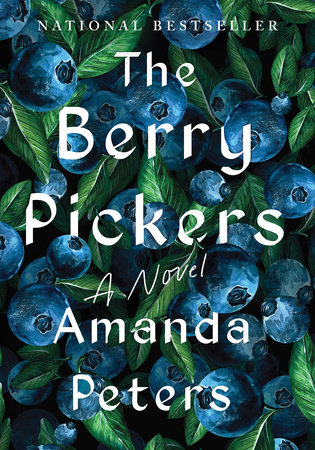
The Berry Pickers
By Amanda Peters
Catapult: Oct. 31, 2023
320 pages, $27.00
There are so many good books being published that it’s impossible to read them all (although my TBR bookcase, stack, and list suggest that I’m deluded enough to try). The Berry Pickers received a lot of attention when it was published last fall. I picked it up and considered reading it two or three times but always concluded that I had so many other books I wanted to read. So back it went onto the shelf. That was a mistake. It’s an impressive and important debut.
The Berry Pickers examines the lengths people will go to for family – to have one, to hold one together, or to rebuild one – and the lies we’ll tell ourselves and others in the process.
The berry pickers of the title are a crew of Mi’kmaw workers from Nova Scotia who travel to Maine in the summer to pick blueberries. One day, a family’s youngest child, four-year-old Ruthie, disappears. The search is unsuccessful, in part because the police are not interested in helping these migrant workers. Eventually, the family reluctantly returns to Nova Scotia and attempts to go on without their daughter and sibling. Ruthie’s six-year-old brother Joe is so haunted by the loss that his life is completely upended. He is one of the novel’s two narrators, a 56-year-old looking back at the difficult, broken lives of the various family members as he battles cancer.
The other narrator is Norma, the only child of an older couple from rural Maine. We learn early on what happened to Ruthie. The mystery that The Berry Pickers probes is why and how. What would compel a woman to kidnap a child? How would she and her husband, a local judge, explain the presence of their new four-year-old daughter who looks nothing like them? How would they keep their secret? Who else was complicit and why?
Norma has vivid dreams of another family and another place, but she can’t make sense of them, and her parents explain it away. As the years pass, they have answers to all of Norma’s questions. Her mother is intensely controlling, while her father is kind but distant. Hemmed in by their rigid ideas of the kind of daughter she should be, she instead develops a close relationship with her Aunt June and her friend Alice. Norma tries to fulfill her parents’ expectations but lives a narrow life with few friends and a nagging sense that something is amiss.
The alternating perspectives allow us to see how the two families manage in the 20 years following Ruthie’s disappearance. Of course, we want to know if Norma will figure out what happened. Or will Joe, who is obsessed with finding Ruthie because he feels her disappearance was his fault, somehow manage to find her?
The structure and plotting allow Amanda Peters to explore the impact of Ruthie’s loss on the various relationships within her birth family, as well as the tensions within her “adoptive” family. As you would expect, no one escapes unscathed from the criminal and immoral act at the heart of the novel. And this is just one story among the tens of thousands of Native American/Indigenous lives that were destroyed by American and Canadian government policies intended to erase them through the removal of children from their families and forced assimilation at “Indian schools.” (For those interested in further reading on the subject, I highly recommend Five Little Indians by Michelle Good and Stealing by Margaret Verble.)
The Berry Pickers is a heartfelt novel about racism, family trauma, identity, and forgiveness. It’s not surprising that it won the Barnes & Noble Discover Prize and the ALA’s Andrew Carnegie Medal for Excellence in Fiction. If you haven’t read it yet, plan to do so soon.
Amanda Peters is a writer of Mi’kmaw and settler ancestry. She won the 2021 Indigenous Voices Award (IVA) for unpublished prose and participated in the 2021 Writers Trust Rising Stars program. She is a graduate of the Master of Fine Arts program at the Institute of American Indian Arts in Santa Fe, New Mexico. Amanda is an Associate Professor in the Department of English and Theatre at Acadia University outside Halifax, Nova Scotia. She lives and writes in the Annapolis Valley of Nova Scotia.